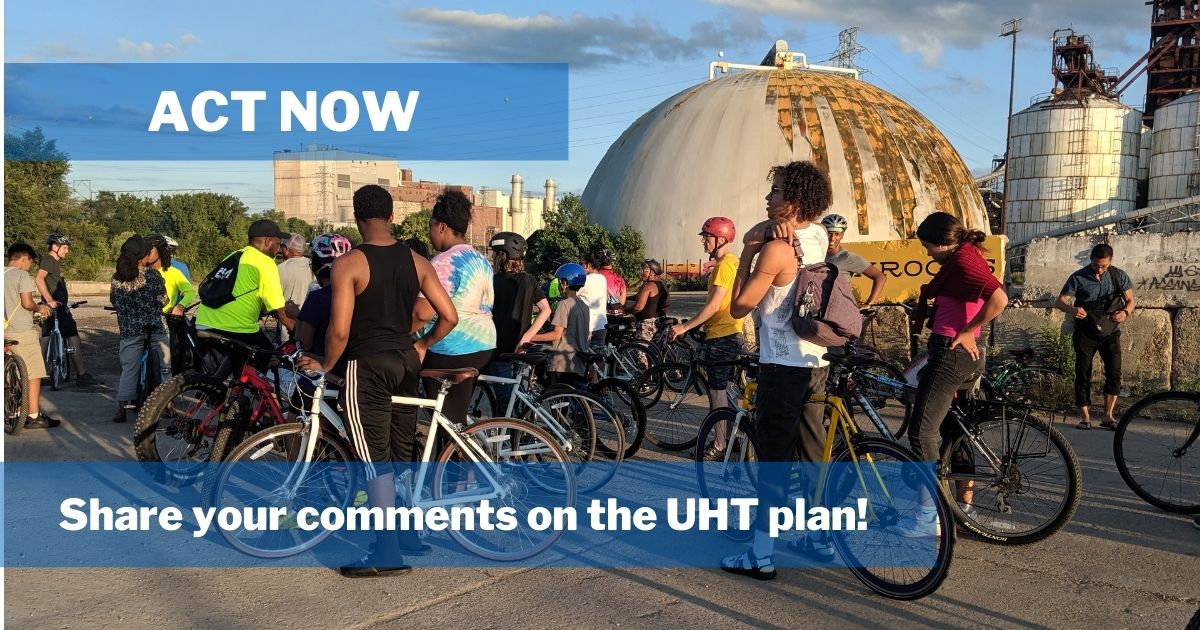Action Alert: Share your comments on Minneapolis' Upper Harbor Terminal redevelopment plan [CLOSED]
The City of Minneapolis is collecting comments on its draft coordinated development plan through January 15 for the Upper Harbor Terminal redevelopment site in North Minneapolis.
This site, which is 48 acres of city-owned land on nearly a mile of Mississippi riverfront, represents a rare opportunity for equitable, creative, transformative community development. We believe that the city's plan falls far short of this potential.
Our concerns
-
This is a significant site on what will soon be prime riverfront land, owned by a city well-known for its inequities. This could have been an incredible opportunity for creative and equitable development, but instead the city went by the same old playbook of letting private developers dictate what gets built.
Why should a wealthy, white-led development team drive the vision here? Why not be more creative and work with the mostly Black and brown neighbors who have the most to lose or gain from this public project? The financial returns promised to the neighborhood (a $3 fee added on to First Avenue's tickets and ground lease revenues) don't seem proportionate to the level of financial benefit the private development team is reaping from the use of public land and public funds. - The coordinated plan has some glaring gaps. The environmental review (called an AUAR, or Alternative Urban Areawide Review) won't be released until after the city council is scheduled to vote on the plan. Other important details, like the Community Benefits Agreements and redevelopment agreements, are not yet complete. We're being asked to approve and commit to an incomplete plan that leaves many crucial questions unanswered.
-
We're still concerned about the First Avenue-managed concert venue, as we always have been. During the past 18 months of coordinated plan development, community members have never been permitted to critically examine whether they want a 7,000-10,000 person concert venue in their neighborhood. And persistent, important questions remain. We still don't know the noise and traffic impacts of the current plan, whether the jobs created will have stable schedules and pay living wages, and whether this project is financially sound. We're disappointed that the city prioritized this as their top priority for state bond funds in 2020, and equally disappointed that the Legislature awarded $12.5 million in public funds for it.
- It's not clear how much more public funding will be needed to develop the entire site to achieve desired affordability in housing and commercial/community spaces. What financial resources need to be marshalled, and will they be sufficient to really deliver on these goals?
- The plan proposes exemptions from the building height limits set out in the city's new Mississippi River Corridor Critical Area (MRCCA) ordinance. It's disappointing to see prompt disregard for these brand-new standards, intended to promote river-oriented design, community connections to the river and environmental sustainability. We believe that North Minneapolis should have the same high standard of riverfront development that the rest of the city enjoys.
Submit your comments and more
All Minneapolis residents are encouraged to share their feedback on the draft plan with the city by January 15. After that comment period closes, the city may make revisions to the coordinated plan before the city council is asked to vote on it. The city council is scheduled to make their final vote on the plan in late February.
If you'd like to learn more about the Upper Harbor Terminal, here's how:
• Review the city's draft coordinated development plan.
• Read FMR's reaction to the draft plan as well as our past articles about the project.
• Check out the Money Power Land Solidarity podcast.
• Join us on January 7 from 5-6 pm for a virtual information session and discussion about the plan.
This Action Alert is no longer available. Sign up to be a River Guardian and we'll keep you updated when the river needs your support. Visit our River Corridor Blog to learn about similar issues.
